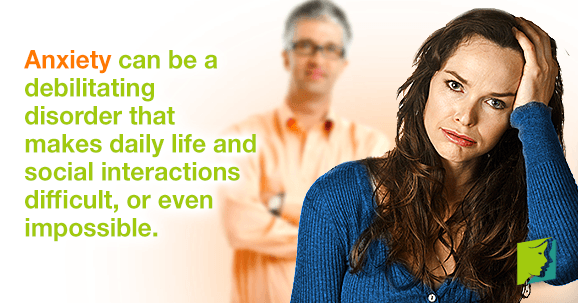Clinical anxiety is a constant feeling of dread, worry, or fear. The disorder can manifest itself differently in different people, and there are a few different types of anxiety that have a clinical definition. Although having any anxiety can affect your social life, social anxiety disorder is the type most commonly associated with social problems. Keep reading for more information on the different types of anxiety and how to prevent the condition from affecting your social life.
What Are the Different Types?
There are several different types of anxiety:
Generalized anxiety disorder (GAD)
This kind of anxiety has no particular trigger or cause most of the time, and it is characterized by a constant sense of dread. People with GAD often worry about aspects of life that would seem irrational to the average person, such as fearing the death of healthy loved ones. This type of anxiety can sometimes make social interaction difficult, due to the negative emotions associated with certain events and interactions with others.
Post-traumatic stress disorder (PTSD)
This form of anxiety occurs in response to a traumatic event, such as war or violent events. It often leads to flashbacks and outbursts, which can negatively affect relationships with others.
Specific phobic disorder
This type of anxiety relates to a particular thing, such as flying or birds. The person will often avoid the focus of their phobia at any cost, and this can affect social, work, and family life.
Social anxiety disorder
This is a disorder relating specifically to social situations. It is far more than simple shyness - it is an extreme fear of being scrutinized or judged by others. Being constantly terrified of humiliating or embarrassing themselves, those who suffer from this avoid social interaction and sometimes withdraw from society.
How to Combat Anxiety
No matter which way anxiety manifests itself, there are a few ways that have been shown to combat it, or at least reduce the severity of the condition. Social interaction is essential for a human being to function properly, and lack of it can often lead to depression. Below are a few tips to prevent anxiety from affecting your social life.
Exercise regularly
At least 150 minutes of exercise every week is highly recommended. Exercise boosts production of the natural mood-elevating neurotransmitters serotonin and endorphines. Regular exercise can lead to a more positive outlook on life, and negative thoughts and worries about interacting with others will lessen.
Get enough sleep
Lack of sleep can cause irritability and irrational thoughts, so one might overthink social interactions during the day and become convinced of negativity. This can lead to a cycle in which a person is more likely to avoid future interactions with others. Getting enough sleep will help prevent overthinking and also reduce cortisol levels, which contribute to feelings of stress.
Avoid negative people
Human beings are emotionally sensitive and are quick to pick up on the cues of others, so spending too much time with highly negative or anxious people is likely to reinforce your own feelings of anxiety. Making sure you are surrounded by people with a more optimistic outlook will mean fewer destructive thoughts.
Don't suffer in silence
Talking about your problems is therapeutic, and many counseling and behavioral therapies are available through medical services. However, it could also be just as helpful to talk to a family member or friend. Reducing the feelings of isolation will relieve anxiety in the long term and make interaction easier, improving your social life.
Anxiety becomes a problem when aspects such as social life are affected, so it is important to deal with the problem. The aforementioned lifestyle remedies are a crucial first step, but it might also be helpful to talk to a doctor, who will be able to determine the best course of action for your personal circumstance.
Sources
- Anxiety and Depression Association of America. (2014). Facts & Statistics. Retrieved August 27, 2014, from http://www.adaa.org/about-adaa/press-room/facts-statistics
- Anxiety and Depression Association of America. (2014). Social Anxiety Disorder. Retrieved August 27, 2014, from http://www.adaa.org/understanding-anxiety/social-anxiety-disorder
- Anxiety and Depression Association of America. (2014). Symptoms. Retrieved August 27, 2014, from http://www.adaa.org/understanding-anxiety/panic-disorder-agoraphobia/symptoms
- Leproult, R. (1997). Sleep loss results in an elevation of cortisol levels the next evening. Sleep, 20(10), 865-870. Retrieved August 27, 2014, from http://www.ncbi.nlm.nih.gov/pubmed/9415946
- National Health Service UK. (n.d). Generalised anxiety disorder. Retrieved August 27, 2014, from http://www.nhs.uk/conditions/anxiety/pages/introduction.aspx
- National Health Service UK. (2014). Stress, anxiety, and depression: The Types of Therapy. Retrieved August 27, 2014, from http://www.nhs.uk/Conditions/stress-anxiety-depression/Pages/types-of-therapy.aspx
- National Institutes of Health. (2014). Anxiety. Retrieved August 27, 2014, from http://www.nlm.nih.gov/medlineplus/anxiety.html
- National Institute of Mental Health. (n.d). Anxiety Disorders. Retrieved August 27, 2014, from http://www.nimh.nih.gov/health/publications/anxiety-disorders/index.shtml?wvsessionid=wv650bd43245ce405884dd789794894544#pub2
- National Institute of Mental Health. (n.d). What Is Anxiety Disorder? Retrieved August 27, 2014, from http://www.nimh.nih.gov/health/topics/anxiety-disorders/index.shtml
- University of California Los Angeles. (2013). UCLA neuroscientist's book explains why social connection is as important as food and shelter. Retrieved August 27, 2014, from http://newsroom.ucla.edu/releases/we-are-hard-wired-to-be-social-248746




